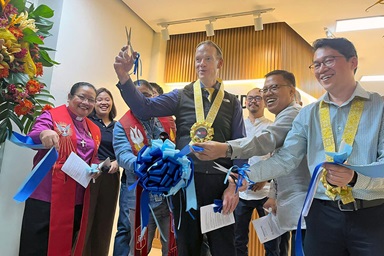Editor's Note: The SMS for Ebola prevention program continues to provide education and inspiration to United Methodist clergy in Sierra Leone and Liberia. World Vision staff in Sierra Leone opted into the messages as well, sharing that staff in the field found them “very helpful, very encouraging, uplifting our souls." Contribute online to this ongoing communications effort.
Amid the most horrific Ebola outbreak in history, The United Methodist Church is sending out hope and life-saving information to Africa twice daily – in 160 characters or less.
Hope is in desperate demand in the Ebola outbreak and so is a clear message about what the disease is, how to prevent it, and how to avoid spreading it.
The Centers for Disease Control and Prevention predicts the highly contagious and deadly virus could infect 1.4 million by the end of January. Hardest hit are the West African countries Guinea, Sierra Leone and Liberia.
how you can help
Read full coverage of The United Methodist Church’s response to the Ebola outbreak at www.umc.org/ebola and donate online to United Methodist Communication’s efforts to help the denomination distribute information about the disease.
The United Methodist Committee on Relief has to date sent $400,000 in grants to Sierra Leone and Liberia. Donate online.
Traditional forms of media do not reach all the people in Sierra Leone and Liberia where the church has congregations and some members are dying from Ebola. Older forms of messaging—megaphones, posters and non-smart mobile phones—work best in remote locations without television and Internet connections.
The Rev. Neelley Hicks, director of ICT4D church initiatives at United Methodist Communications, said Freeplay Assist Radios designed specifically for humanitarian purposes are going to Sierra Leone and Liberia. The FM/AM/SW radios have built in flashlights, siren and emergency mobile phone charging capability. They can be hand-cranked or solar powered. ICT4D stands for information and communications technologies for development.
Radio is an important and more available form of communication. The Liberia United Methodist Annual Conference has a radio station that has been broadcasting messages about Ebola since the first cases were reported in that country.
FrontlineSMS, a free, open-source texting service that doesn’t rely on Internet connection and can send out messages to groups, is being used by the church to send out text messages twice a day that both inform and soothe.
Informative messages such as: “Ignore rumors such as ‘Simply saying Ebola’ aloud transmits the disease. That is false!” are mixed with words from the Bible to inspire hope.
“And the peace of God, which surpasses all understanding, will guard your hearts and your minds in Christ Jesus,” another text states.
UMC in West Africa
The messages go initially to 160 active ordained United Methodist pastors in Sierra Leone and 24 district superintendents in Liberia, but are intended for sharing across their individual networks and, exponentially, beyond their networks to reach as many people as possible. By having trusted clergy leaders relay the messages, the church aims to counter the rumors and misinformation still swirling about the outbreak.
The spiritual messages come from Bishop John Innis, Liberia; and Bishop John Yambasu, Sierra Leone. There are 225,000 United Methodists in 324 churches in Sierra Leone and 148,382 members in 609 churches in Liberia. There are 404 active ordained clergy in Liberia.
United Methodist Communications is sending the messages from Nashville on behalf of the bishops and the denomination.
“In the Ebola crisis, communication precedes prevention and treatment,” said the Rev. Larry Hollon, top executive United Methodist Communications.
“The contagion seems to be growing exponentially according to international health officials. Along with medical personnel, facilities for treatment and containment, and medical supplies, communication is essential. However, new cases are outpacing the installation of treatment facilities. Because of this, containment is moving to home health care. People will need instruction and health kits. In these conditions communication is becoming even more important,” Hollon said.
Communicating on the ground
The FrontlineSMS text messages started in mid-August.
“The goal is to develop more same-day communication systems for people on the ground,” said Hicks. The text messages “leap frog” over email and reach people who don’t have access to computers and Internet connections. ICT4D stands for information and communications technologies for development.
Ken Banks, developer of Frontline SMS, recently wrote a blog for How We Get To Next about the technology being used by the church in this health crisis.
“With a large international effort under way, United Methodist Communications is leading the field on the technology front. UMC have been using tools such as FrontlineSMS for some time to help disseminate and collect all manner of information through mobile phones, and today it is turning its attention to helping communities use the technology to deal with the Ebola outbreak,” he wrote.
A multimedia team of reporters from United Methodist Communications was in Sierra Leone to report on a major mosquito net distribution in Bo in early June when the first reported cases of Ebola were coming into a clinic in Kenema. Since then, United Methodist communicators Phileas Jusu in Sierra Leone and Julu Swen in Liberia have been filing almost daily reports.
Yambasu and Innis also immediately starting preaching and spreading the word about Ebola from pulpits, and through YouTube videos, radio, television and Internet outlets.
The messages are coming in loud and clear in scriptures, precautionary tips for homes, community and churches and in prayers. All in 160 characters including “Amen.”
“God of compassion, with you and your children, we weep. Comfort all who have no one to weep for them. Amen.”
Gilbert is a multimedia news reporter for United Methodist News Service. Contact her at (615) 742-5470 or [email protected].
Like what you're reading? Support the ministry of UM News! Your support ensures the latest denominational news, dynamic stories and informative articles will continue to connect our global community. Make a tax-deductible donation at ResourceUMC.org/GiveUMCom.





